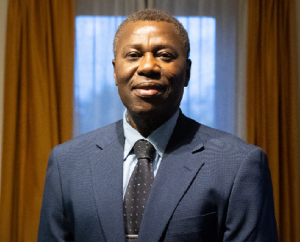From a 2-bedroom apartment to sleeping in prayer camps and wandering in the streets; 80-year-old Joana Abban tells her emotive story of how she has had to live each day for years, struggling for a decent place to lay her head and rest her frail body.
Mrs. Abban who in her bloom worked as a civil servant in the ministries met her ‘woes’ when life hit hard at her in the most unlikely way, leaving her with the sad fate of living her most difficult years aged, depressed and dejected.
She began work as a typist at the Registrar General’s department in 1960, moved to the state function secretariat subsequently in 1961 and finally transferred to the Ministry of Health after her maternity leave where she worked for 15 years till her retirement.
She got herself a decent two-bedroom apartment and things were running quite smoothly for her and got better when her only daughter got married and had children who were her ultimate source of joy.
Shortly after, things started going wrong, one after the other the hardships of life slapped her in the face.
Her daughter’s marriage hit the rocks, leaving her with her children. They had to move in to her two-bedroom apartment as a result and then time came for her grandson to go school. It was the biggest decision for Joana at that point; sacrificing to give up her 2-bedroom apartment or letting her grandson stay home and drop out of school for lack of funds to further his education.
Choosing the former meant a life-changing consequence but having the good of her family as her priority, she gave up her home, packed together with her daughter and her grand-children for the home of a relative who opted to house them for a while. That also didn’t last when she was asked to pack out. It was then that her prayer camp ‘perching’ journey began.
Narrating her story on JoyNews, she said: “
“My grandson who had 10 ones in BECE, the father was nowhere to be found, my daughter could not do it, what can I do when my grandson was going to school? What do I have? All I have is this two bedroom house, let it go so my grandson will go to school and now here I am”.
"My daughter narrated the story to a cousin of her husband who is living in Kwabenya so the man said that we should come. We got everything of ours down to Kwabenya, that was in 2012, 13. We were all there in Kwabenya in her husband’s cousin’s house and on the 31st of December, I went for watchnight service, when I came, my daughter came with the children from a watchnight service and asked if I had heard the news, that her cousin’s wife says she won’t stay with me in the house so I should leave, I wondered what I had done”.
“I packed up, I went with a friend, I stayed with the friend at Nungua for one year and because I wasn’t providing anything, she sacked me so I went to another place, and then another before I started visiting the churches to tell the heads I have nowhere to live, they let me sleep there for a while then the workers start sacking me. I went to Hebron prayer center and the workers sacked me, they said we don’t keep long at prayer camps, at least two weeks but when it gets to a month, it becomes too much so you are asked to go out. I ran there, came to another one at Lashibi, stayed there, the man cared for me and gave me money sometimes, but the same thing happened and I ran back to Hebron"
"My problem also was I urinated too much and there’s no other place to sleep than in the church room which is considered sacred. So I had a bucket in which I was doing it and I was discovered by the security man one day. I think he said something so I was called and given some GHC 500 and told to go. “I cried again because I had been sacked and I asked myself where do I go next? I left a week after and was going to a woman at Kwabenya and they refused to give me a place so I came to Nungua, found a guest house and slept”.
All efforts she explained, to enroll on government’s LEAP program proved futile as she wasn’t even given an ear when she visited one of their offices. Her daughter together with their grandchildren she explained are currently in a clumsy single bedroom house which cannot accommodate her as well. Her relatives she explained have warded her off.
“My daughter now is living in a single bedroom, very small, with the children so automatically, I can’t go there. Extended family is there but for us, when your brother is married, you don’t go there. You see him, if he has something for you, he gives it to you, that’s all. Don’t go to the family, don’t go there. Why? Only God knows, that’s the family in which I find myself in,” she said.
“I went to the leap office near the ridge hospital, I sat there the whole day, I was told the one who was supposed to come was at a meeting so I didn’t see him. I didn’t even know LEAP, someone suggested it to me, he said I qualified for LEAP and he told me about it”, she added.
Joana, in tears said, “Only God knows where I will sleep today. I go to the camps, when day breaks, I come out, so I’ve been praying, trusting God since 2014, 4 years”.
Speaking on the subject however, experts Dr. Rita Amankwah, Director of Social Protection at the Ministry of Gender and Felix Logah, Assistant Director, Programme Development at the Ministry of Gender stressed on the importance of factions; family and other social groups coming together on such issues to take up responsibility and take care of the aged in society.
Probing has to be done in this instance they suggested, to discover more angles to the issue and contact individuals connected. She might have to be sent to a Social Service Center at Bekwai in the Ashanti Region to be catered for after all necessary procedures have been put in place.
The country has to deal with such issues, not only the responsibility of the government, the family, social groups also have a role to play ensuring a sustainable way of taking care of the aged in society.
General News of Wednesday, 13 June 2018
Source: www.ghanaweb.com













